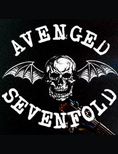Avenged Sevenfold Guitarists Discuss Their Wicked Playing Styles

Originally published in Guitar World, October 2010
Zacky Vengeance and Synyster Gates open up about their wicked-and-wild guitar styles.
GUITAR WORLD Your dual-guitar harmony lines are arguably Avenged Sevenfold’s most recognizable musical calling card.
ZACKY VENGEANCE Absolutely. What makes Avenged so exciting to me musically is that people either love us or hate us, but nobody sounds like us. And when it comes to our dueling guitars, we choose notes in a way that I’ve never heard other bands do it. I think on some of our earlier albums the harmonies are more straightforward. But as we’ve grown over the past three albums they’ve become much more defined. They intertwine in a way that isn’t typical.
GW Are you at all influenced by classic dual-guitar harmony bands like Iron Maiden and Thin Lizzy?
SYNYSTER GATES We’re fans of stuff like Maiden, but I think we generally get it from weirder places. For me, the Eagles’ “Hotel California” represents one of the most brilliant harmony approaches to music. Boston did it very well, too. And then there are bands like Dream Theater, where [John] Petrucci does great harmony lines with the keyboard, or Mr. Bungle, where it’s guitar and saxophone, which I think is absolutely brilliant.
GW Have you learned from one another as guitarists?
Get The Pick Newsletter
All the latest guitar news, interviews, lessons, reviews, deals and more, direct to your inbox!
VENGEANCE I’ve probably tightened up my playing a little bit, and Brian [Synyster] has maybe let loose a little more, because I think my style is more raw and he’s a little more refined. But I’ve learned a lot from Brian. After City of Evil, I felt like, anything Brian could play, I could play too if you gave me a day. And then he’d come up with stuff on the next album and this album where I’d be like, Oh shit, I have to sit down and work on it again. I always look forward to when he comes up with that next crazy run and tries to make it faster than anything he’s done before, and I have to add to it. It’s always a challenge.
GW Synyster, you do a substantial amount of shredding on Nightmare, but on songs like “So Far Away” and “Danger Line” you showcase a slower, more melodic side of your soloing.
GATES If I’m proud of one thing in my playing it’s being able to slow it down and focus on the melody. And on this record it really happened for me on those two songs. Some people will basically just shred all over everything, even a ballad. I’m glad I wasn’t born with that genetic chip—the need to just wheedle-whee all over the place.
GW That said, on a song like “Save Me,” there are solo sections where you must have said, “I’m just gonna blow some heads off.”
GATES [laughs] Yeah, there’s definitely some of that. But I hope that even if it’s too fast for people to hook onto any melodies, there’s still a vibe to it. Of course, “Save Me” is like four different complete blasphemies of vibes! It’s the last song on the record, and it’s over 10 minutes long. At that point it’s like, You think you’ve heard a bunch of crazy shit, but this is the craziest shit yet.
GW Along those lines, it’s clear that the band puts a lot of time and effort into song arrangement, in particular in the way you often incorporate decidedly un-metal instruments like pianos, strings and horns into the mix. Where does that come from?
GATES It’s a result of being an extremely hands-on band, and it comes out of a lot of trial and error. We listen to lots of classical music, including guys like [French Impressionist composer] Claude Debussy. And the contemporary favorite is certainly [film and TV composer] Danny Elfman. He’s just so incredible. His soundtrack for Edward Scissorhands is one of my favorite pieces of music of all time. So we’ll listen to all this music and study what’s going on on top of and underneath the melody, what kinds of instruments support the different instruments that are playing the melody—all that stuff. We spend a lot of time with MIDI keyboards and various processors, and we just figure it out. And all those things you hear in our songs work as submelodies and countermelodies, and everything has to fit.
GW Zacky, do you come from a musical family?
VENGEANCE My dad played some guitar, and both my parents are fans of music and have huge record collections. I remember when I was a kid, every time the Beatles were on the radio my dad would say he’d give me a dollar if I could tell him what band it was. So by the time I was about nine I knew to just say “the Beatles,” and I’d get a dollar out of it. [laughs] And I still have my dad’s first guitar, a Yamaha acoustic, which also happened to be my first guitar. It’s a right-handed model, so I flipped it upside down and learned to play [Bob Marley’s] “Redemption Song” on one string. Basically, everything I’ve learned on guitar I’ve learned from listening to my favorite albums. I never had any formal training. My teachers were Dimebag Darrell and Slash and the guys in Rancid and Slayer.
GW Synyster, as a teenager you attended GIT with a focus on jazz guitar.
GATES I was in love with metal and jazz, though what I studied was more fusion oriented, actually. And then I also did a lot of traditional, old-school bebop jazz–type stuff.
GW And your father, Brian Haner, is also a professional musician.
GATES He was a studio guy back in the day. He did a bunch of work with Tower of Power, Rose Royce—a lot of R&B and funk-type stuff. And when he was about 17, he played with Frank Zappa. I think it was around the 200 Motels period [1971], though he’s not on any of Zappa’s albums. But he always plays a little bit on our records, and he’s definitely shown me quite of bit of shit over the years.
GW Anything you’ve shown him?
GATES Well, when I started getting into sweep picking I noticed he was popping into my room a bit more.
GW So you taught Dad how to sweep?
GATES Fuck yeah, dude!
“Such a rare piece”: Dave Navarro has chosen the guitar he’s using to record his first post-Jane’s Addiction material – and it’s a historic build
“The best guitar player I ever heard”: Nashville guitar extraordinaire Mac Gayden – who worked with Bob Dylan, Elvis, Linda Ronstadt and Simon & Garfunkel – dies at 83




![[from left] George Harrison with his Gretsch Country Gentleman, Norman Harris of Norman's Rare Guitars holds a gold-top Les Paul, John Fogerty with his legendary 1969 Rickenbacker](https://cdn.mos.cms.futurecdn.net/TuH3nuhn9etqjdn5sy4ntW.jpg)





